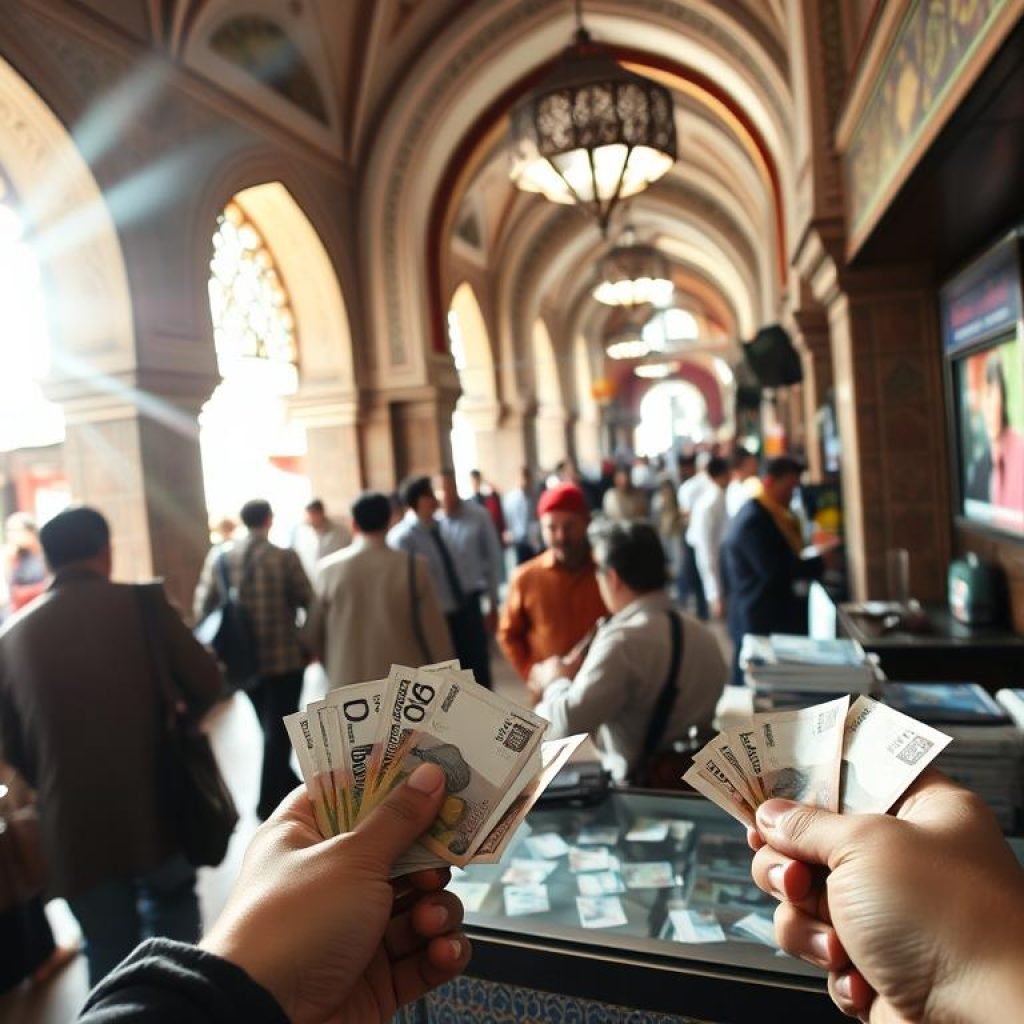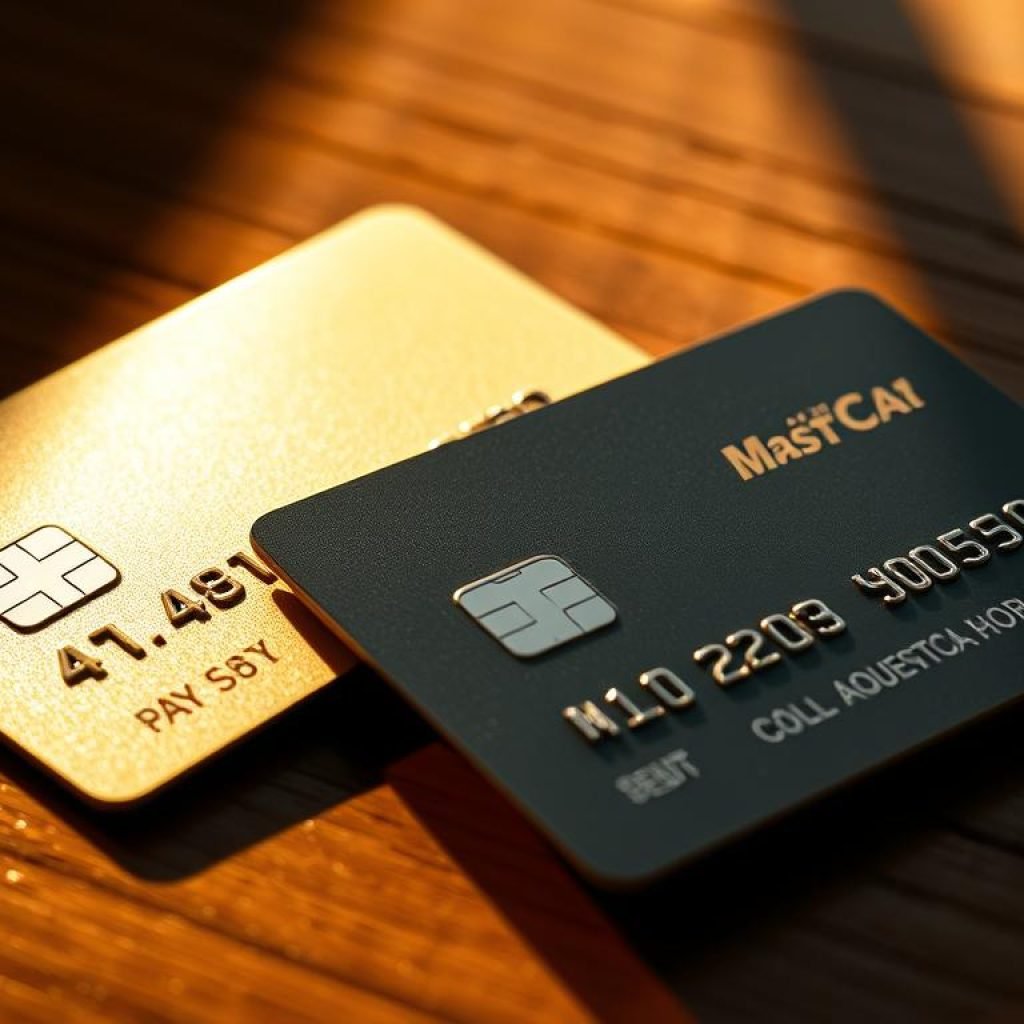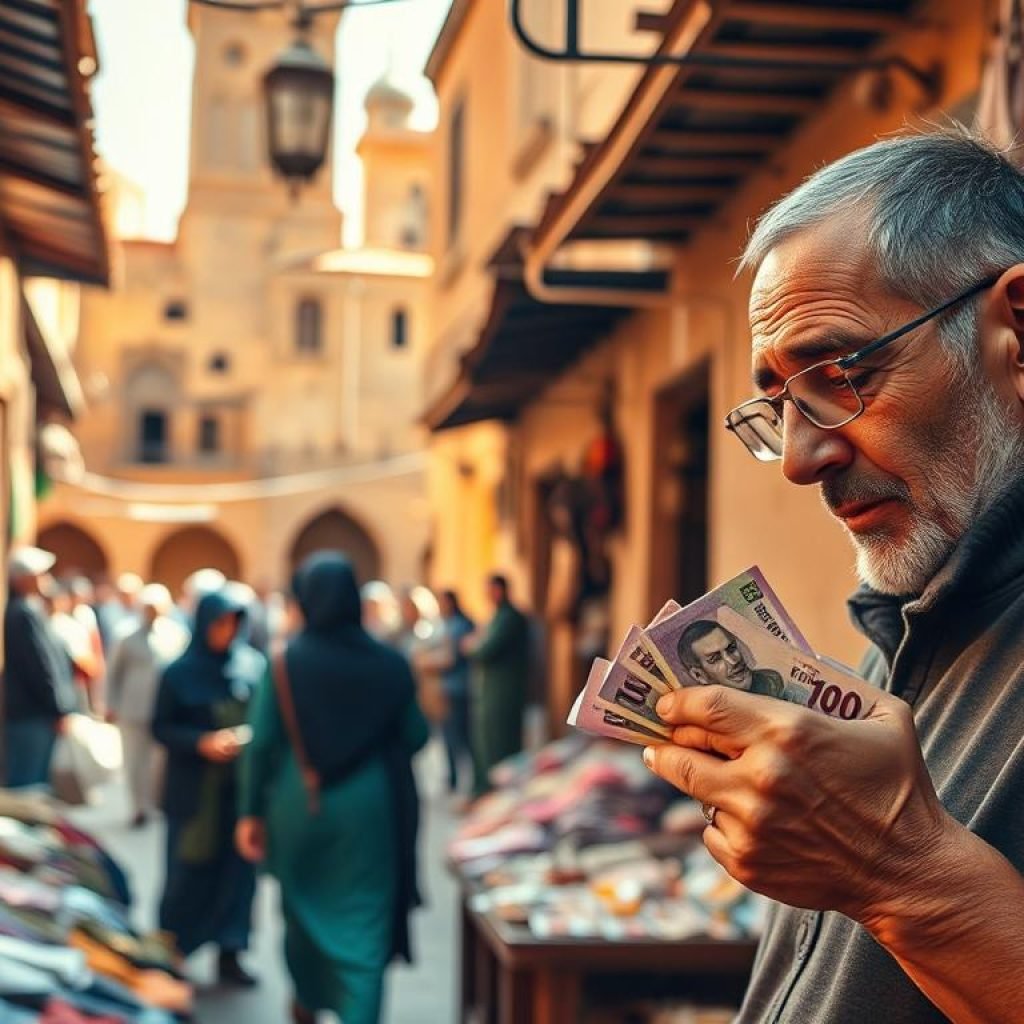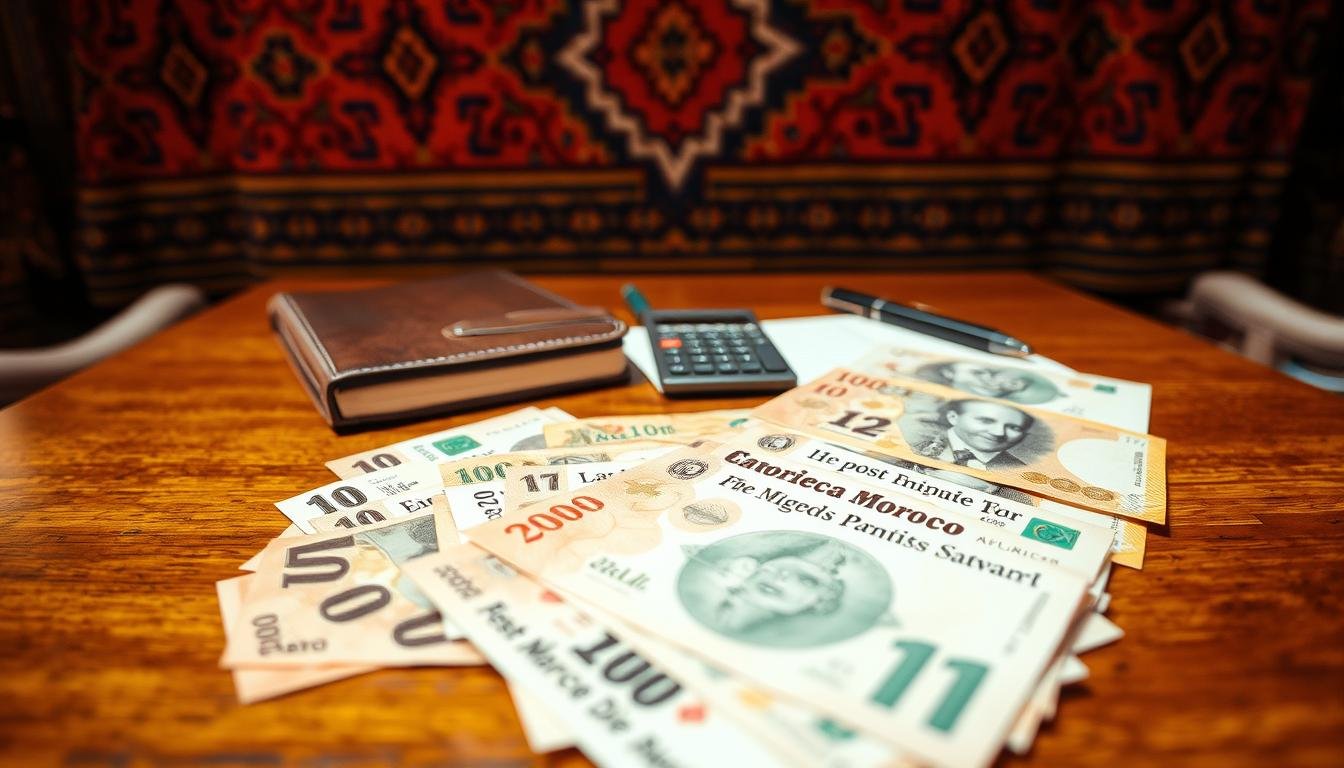Traveling to a new country is always exciting, but managing your finances effectively can make or break your experience. Understanding the local currency and payment methods is essential for a smooth trip. In Morocco, the official currency is the Moroccan dirham (MAD), which comes in both coins and banknotes.
For U.S. travelers, using tools like the Wise Multi-Currency Card can simplify spending and conversions. This card allows you to hold and convert funds in multiple currencies, making it easier to stick to your budget. Whether you’re exploring bustling markets or enjoying local cuisine, having the right payment method ensures you won’t miss out on any experiences.
Planning ahead and knowing how to manage your funds can save you from unnecessary stress. This guide will help you navigate the financial aspects of your trip, from avoiding fees to making safe transactions. Let’s dive into practical tips to make your journey seamless and enjoyable.
Key Takeaways
- The Moroccan dirham (MAD) is the official currency used in Morocco.
- The Wise Multi-Currency Card is a convenient tool for managing travel expenses.
- Understanding local payment methods helps avoid unnecessary fees.
- Budgeting is crucial for a stress-free travel experience.
- Always carry some local cash for smaller transactions.
Understanding the Moroccan Dirham
Navigating a new currency can feel overwhelming, but understanding the basics makes it easier. The Moroccan dirham (MAD) is the official currency used in the country. It’s a closed currency, meaning it’s not widely available outside the region. This makes it essential to familiarize yourself with its denominations before your trip.
Overview of Currency Denominations
The dirham comes in both banknotes and coins. Banknotes are available in 20, 50, 100, and 200 denominations. Each note features the image of the monarch, adding a cultural touch to your transactions. Coins, on the other hand, are smaller and come in 1, 2, 5, 10, 20, and 50 units.
Banknotes and Coins Explained
Banknotes are ideal for larger purchases, while coins are perfect for smaller transactions. However, small change can be scarce, so it’s wise to carry a mix of both. For example, a 20 dirham note is handy for street vendors, while 5 or 10 dirham coins are useful for tipping or public transport.
Understanding these denominations helps avoid confusion during transactions. It also ensures you’re prepared for any situation, whether you’re shopping in a bustling market or paying for a taxi ride.
Preparing Your Budget and Currency Exchange Strategy
Understanding currency exchange strategies can save you time and money. Before your trip, it’s essential to plan your budget and familiarize yourself with the exchange rate. This ensures you get the best value for your funds and avoid unnecessary fees.

Using Online Currency Converters and the Mid-Market Rate
Online currency converters are invaluable tools for travelers. They provide real-time exchange rates, helping you understand how much your money is worth in the local currency. Always look for the mid-market rate, which is the true exchange rate without hidden fees.
For example, if the mid-market rate for 1 USD to MAD is 9.547, you’ll know exactly how much you’re getting. Using tools like the Wise app ensures you get this rate, saving you money compared to traditional exchange services.
“The mid-market rate is the fairest exchange rate you can get, free from markups or hidden charges.”
Planning your budget with accurate currency conversion tools is crucial. It helps you avoid overspending and ensures you have enough funds for your trip. Here’s a quick comparison of exchange methods:
| Method | Exchange Rate | Fees |
|---|---|---|
| Airport Exchange | Unfavorable | High |
| Local Banks | Moderate | Moderate |
| Wise App | Mid-Market | Low |
By preparing ahead, you can reduce anxiety and focus on enjoying your trip. Knowing the conversion costs and using reliable tools ensures you’re always in control of your finances.
Using ATMs and Handling Cash in Morocco
Accessing cash in a foreign country doesn’t have to be stressful if you know the best practices. ATMs, locally known as guichets automatiques, are widely available and offer a convenient way to withdraw funds. However, understanding how to use them effectively can save you from unnecessary fees and hassles.
The Benefits of ATM Withdrawals
Using ATMs is one of the easiest ways to get local currency. Most machines dispense 100 and 200 dirham notes, which are ideal for larger purchases. However, smaller denominations can be harder to come by, so it’s wise to break larger bills when possible.
For U.S. travelers, the Wise Multi-Currency Card is a great option. It minimizes conversion fees and allows you to withdraw cash at the mid-market rate. This ensures you get the best value for your money.
Avoiding High Fees at Airports and Hotels
Exchanging currency at airports or hotels often comes with high fees and unfavorable rates. Instead, opt for ATMs located in banks or less touristy areas. These typically offer better rates and lower charges.
When using an ATM, always choose to be charged in the local currency. This avoids dynamic currency conversion, which can add hidden costs to your transaction.
“Choosing local currency over dynamic conversion can save you money and ensure a fair exchange rate.”
Here are some quick tips for handling cash effectively:
- Carry a mix of small and large bills for different transactions.
- Avoid ATMs in tourist-heavy areas to reduce fees.
- Always check your bank’s international withdrawal policies.
By following these practices, you can manage your finances efficiently and focus on enjoying your trip.
Choosing the Right Payment Methods
Selecting the right payment methods can significantly impact your travel experience. While card payments are widely accepted in cities and tourist areas, surcharges are common. Understanding the pros and cons of each option helps you manage your finances efficiently.

Debit and Credit Card Considerations
Using a debit card or credit card offers convenience, especially in urban areas. However, merchants often add surcharges for card transactions. It’s essential to check with your bank for foreign transaction fees to avoid unexpected costs.
The Wise debit card is a great alternative. It allows you to hold multiple currencies and offers low conversion fees. This makes it ideal for travelers who want to minimize extra expenses.
“Choosing the right payment method ensures smoother transactions and better control over your budget.”
Here’s a quick comparison of payment methods:
| Method | Pros | Cons |
|---|---|---|
| Debit Card | Widely accepted, easy to use | Surcharges, foreign transaction fees |
| Credit Card | Rewards, purchase protection | High fees, not accepted everywhere |
| Wise Debit Card | Low fees, multi-currency support | Limited free withdrawals |
Cash is still essential for smaller transactions, especially in rural areas. Always carry a mix of payment options to ensure you’re prepared for any situation. By choosing the right method, you can enjoy a hassle-free travel experience.
Avoiding Unnecessary Fees and Unfavorable Exchange Rates
Saving on fees while traveling is easier when you know the right strategies. One of the most common pitfalls is Dynamic Currency Conversion (DCC). This occurs when a foreign ATM or merchant offers to charge you in your home currency instead of the local currency. While it might seem convenient, DCC often comes with hidden fees and unfavorable exchange rates.
What is Dynamic Currency Conversion?
DCC is a service that allows you to see the cost of a transaction in your home currency. However, the exchange rate used is typically worse than the mid-market rate. This means you end up paying more than you should. For example, a 12% markup on a $200 withdrawal could cost you an extra $25.
Why Choose Local Currency?
Always opt for local currency when given the choice. This ensures you get the mid-market rate, which is the fairest exchange rate available. By avoiding DCC, you can save significantly on international transactions.
“Choosing local currency over dynamic conversion can save you money and ensure a fair exchange rate.”
Practical Strategies to Avoid Extra Fees
Here are some effective ways to minimize fees and unfavorable rates:
- Use ATMs at major banks or post offices, as they often have lower fees.
- Withdraw larger amounts of cash at once to reduce frequent transaction fees.
- Notify your bank before traveling to prevent automated blocks on your card.
- Read transaction details carefully before approving any payment.
Examples of Savings
For instance, withdrawing 200 euros with DCC might cost $258, while choosing local currency could bring the cost down to $225. Similarly, using a card like the Wise Multi-Currency Card ensures you get the mid-market rate with minimal fees.
| Transaction Type | Cost with DCC | Cost Without DCC |
|---|---|---|
| ATM Withdrawal | $258 | $225 |
| Credit Card Purchase | $1212 | $1120 |
By understanding these ways to avoid extra costs, you can make smarter financial decisions and enjoy a stress-free trip. Always prioritize local currency to ensure you get the best value for your money.
Morocco Money Tips for Smart Spending
Smart spending during your travels ensures you make the most of every dirham. By understanding the best tools and practices, you can avoid unnecessary fees and focus on enjoying your trip. This guide will walk you through practical strategies to manage your funds effectively.

Utilizing the Wise Multi-Currency Card
The Wise Multi-Currency Card is a game-changer for travelers. It allows you to hold and convert funds in over 40 currencies, including the Moroccan dirham. This eliminates the need for multiple cards and reduces conversion fees.
To get started, simply download the Wise app and create an account. You can then top up your card in your home currency and switch to dirhams at the mid-market rate. This ensures you get the fairest exchange rate without hidden charges.
“The Wise card offers transparency and savings, making it a must-have for international travelers.”
Best Practices for Local Currency Transactions
When using the Wise card, always choose to pay in the local currency. This avoids dynamic currency conversion, which often comes with unfavorable rates. For example, withdrawing 200 dirhams with DCC might cost you an extra $5 compared to using the mid-market rate.
Here are some additional tips for smart spending:
- Carry a mix of cash and cards for flexibility.
- Use ATMs at major banks to avoid high fees.
- Notify your bank before traveling to prevent card blocks.
By following these strategies, you can save significantly and enjoy a stress-free trip. For more detailed insights, check out this comprehensive guide on managing your money in Morocco.
Tipping Etiquette in Restaurants and Hotels
Understanding local customs around tipping can enhance your travel experience and show appreciation for excellent service. In many places, tipping is customary and often expected, especially in the service industry. Knowing the right amounts and when to tip ensures smooth interactions and reflects cultural respect.
Standard Tipping Percentages and Scenarios
In restaurants, a tip of 10% to 15% of the bill is standard. For exceptional service, you might consider leaving up to 20%. For example, if your meal costs 100 dirhams, a 10 to 15 dirham tip is appropriate. Always check if a service charge is already included in the bill to avoid double tipping.
In hotels, tipping varies by service. Housekeeping staff typically receive 5 to 10 dirhams per day, while porters may expect 1 dirham per bag. For concierge services, a tip of 10 to 15 dirhams is customary for exceptional assistance.
Tips for Service Providers and Porters
Service providers like taxi drivers and tour guides also appreciate tips. For taxi rides, rounding up the fare or adding 10% for longer journeys is common. Tour guides often receive 10% of the tour cost, while drivers on multi-day tours may expect 100 dirhams per day.
“Tipping is a way to acknowledge good service and support workers who rely on these additional earnings.”
Using Local Currency When Tipping
Always tip in the local currency to avoid extra exchange costs. Carrying small denominations of dirhams ensures you’re prepared for various tipping scenarios. For instance, having 5 or 10 dirham notes is useful for quick transactions like tipping valets or parking attendants.
Here’s a quick guide to tipping in different scenarios:
| Service | Suggested Tip |
|---|---|
| Restaurant Meal (100 dirhams) | 10-15 dirhams |
| Housekeeping (per day) | 5-10 dirhams |
| Porter (per bag) | 1 dirham |
| Taxi Ride (50 dirhams) | 5 dirhams |
| Tour Guide (full day) | 200 dirhams |
By following these guidelines, you can navigate tipping with confidence and ensure a positive experience for both you and the service providers.
Budgeting for Tours, Transport, and Daily Expenses
Planning your daily expenses while traveling ensures a stress-free and enjoyable experience. Allocating funds for tours, transport, and meals helps you make the most of your trip. Here’s how to budget effectively for your adventures.
Start by estimating the amount you’ll need for daily activities. For example, a 3-day Sahara Desert tour costs around £264 for two people. Similarly, local transport like taxis and buses can add up, with an average daily spend of £9.96 per person.
Here are some strategies to manage your budget:
- Allocate a daily amount for meals, transport, and activities.
- Use apps to track spending and avoid overspending.
- Set aside extra funds for unexpected costs like entrance fees or tips.
Different cities have varying costs. For instance, accommodation in Marrakech averages £21.37 per night, while in Chefchaouen, it’s £16.33. Knowing these differences helps you plan better.
“Smart budgeting ensures you can enjoy every experience without financial stress.”
Here’s a breakdown of average daily expenses:
| Category | Cost (Per Person) |
|---|---|
| Accommodation | £18.60 |
| Meals | £30 |
| Transport | £9.96 |
| Activities | £34.18 |
By planning ahead and tracking your spending, you can enjoy your trip without worrying about finances. Always carry a mix of cash and cards for flexibility, and prioritize experiences that matter most to you.
Staying Safe and Secure with Your Money Management
Ensuring your financial safety is a top priority when exploring new destinations. Traveling involves managing funds across different platforms, and staying vigilant can prevent unexpected issues. By following a few simple strategies, you can protect your finances and enjoy a stress-free journey.
Protecting Your Cards from Fraud
Credit and debit cards are convenient, but they can be targets for fraud. Always keep your cards in a secure place, and avoid sharing details with strangers. When making a transaction, shield your PIN and ensure the card reader is legitimate.
Consider using RFID-blocking wallets to prevent electronic theft. These wallets protect your cards from unauthorized scans, adding an extra layer of security.
Monitoring Transactions and Avoiding Fees
Regularly check your bank statements for any unauthorized transactions. If you notice anything suspicious, contact your bank immediately. This helps prevent further misuse of your account.
When making a foreign transaction, choose to pay in the local currency. This avoids dynamic currency conversion, which often comes with hidden fees. For example, paying in euros instead of dollars can save you money on exchange rates.
Using Secure ATMs and Trusted Channels
Always use ATMs located in well-lit, secure areas. Avoid standalone machines in remote locations, as they may be tampered with. For withdrawals, opt for ATMs at major banks or post offices, as they are less likely to have skimming devices.
Notify your bank of your travel plans to prevent your card from being blocked. This ensures uninterrupted access to your funds while abroad.
“Taking these precautions ensures your financial safety and allows you to focus on enjoying your trip.”
Steps to Take in Case of Suspected Misuse
If you suspect your card has been compromised, act quickly. Contact your bank to freeze the card and prevent further transactions. Keep a copy of your card details and bank contact information in a secure place for emergencies.
Photograph your cards and store the images in a password-protected folder. This provides quick access to essential information if your card is lost or stolen.
By following these strategies, you can manage your finances securely and avoid unnecessary stress. Always prioritize safety and stay informed about the best practices for handling your funds while traveling.
Conclusion
Exploring a new place is always an adventure, but managing your finances wisely ensures a smooth journey. By using the local currency and planning your budget effectively, you can avoid unnecessary fees and focus on enjoying your experience. Tools like the Wise Multi-Currency Card simplify transactions, offering secure and cost-effective solutions for travelers.
Following this guide helps you save time and money, making your trip more enjoyable. Whether you’re navigating markets or dining at local restaurants, these strategies ensure you’re prepared for every situation. For more insights on budget-friendly travel in Morocco, explore additional resources and make the most of your journey.
By applying these tips, you can enjoy a stress-free and smart spending experience. Plan ahead, stay informed, and make every moment count in your new destination.




Comment (0)